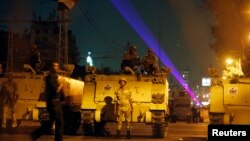At least two people have been killed in clashes between the supporters and opponents of deposed Egyptian President Mohamed Morsi in the Nile Delta city of Mansura.
Rival protests were staged Friday in several cities across Egypt.
In Cairo, thousands of Morsi supporters answered the call by the Muslim Brotherhood, pouring into the streets to demand the reinstatement of the Islamist president.
Morsi's supporters joined again Friday in what has been a daily sit-in outside the Rabia el-Adawiya Mosque in Cairo's Nasr City, a Brotherhood stronghold, while others marched near Cairo University.
"I've come out to support legitimacy. Not because of President Morsi, but to support legitimacy. They stole the vote that I cast in the elections. I want to ask al-Sisi [head of the armed forces], where is my vote? Where did my vote go, Sisi? And why did you put this guy [Morsi] in jail when he didn't do anything?" asked one Morsi supporter.
Anti-Morsi activists also demonstrated in Cairo's historic Tahrir Square, raising concerns of potential clashes between the two groups.
Egypt's military has warned it will not tolerate any violence, sending tanks and troops to various parts of the capital Friday. In some areas, soldiers set up barbed-wire barricades.
Also Friday, U.S. Secretary of State John Kerry, in Jordan, called new Egyptian Foreign Minister Nabil Fahmy. Egyptian officials said the two expressed hopes for Egypt's transition back to democracy.
Late Thursday, interim President Adly Mansour went on national television and pledged a "battle for security to the end" against those he says want to drive the country into chaos.
Mansour said Egypt is at a "decisive moment" and must be protected against those who are looking to bring "violence and bloodshed."
"I reaffirm to you all my commitment and the government's commitment to restore security and stability in our country. We will not be scared or alarmed, and we will not go easy on those who kill the innocent," said Mansour. "We will fight a battle of security to the end, we will protect the revolution, we will build the nation and we will move forward without hesitation."
Human Rights Watch says that a general sense of lawlessness across Egypt has led to a sharp increase in sectarian attacks and human rights abuses across the country.
Although many of the protests have been peaceful, clashes between groups of protesters and with police have left dozens dead.
Earlier this month, 51 Islamist protesters and three security officers died during an incident outside a compound where Morsi was believed to be held.
Morsi's Muslim Brotherhood does not recognize Mansour as president. It has refused to participate in a military-backed transition government or compete in upcoming elections to decide a new constitution, president and parliament.
Instead, the Islamist group hopes to keep up the pressure with constant sit-ins and protests against what it considers a military coup against Morsi, the country's first freely elected leader.
Rival protests were staged Friday in several cities across Egypt.
In Cairo, thousands of Morsi supporters answered the call by the Muslim Brotherhood, pouring into the streets to demand the reinstatement of the Islamist president.
Morsi's supporters joined again Friday in what has been a daily sit-in outside the Rabia el-Adawiya Mosque in Cairo's Nasr City, a Brotherhood stronghold, while others marched near Cairo University.
"I've come out to support legitimacy. Not because of President Morsi, but to support legitimacy. They stole the vote that I cast in the elections. I want to ask al-Sisi [head of the armed forces], where is my vote? Where did my vote go, Sisi? And why did you put this guy [Morsi] in jail when he didn't do anything?" asked one Morsi supporter.
Anti-Morsi activists also demonstrated in Cairo's historic Tahrir Square, raising concerns of potential clashes between the two groups.
Egypt's military has warned it will not tolerate any violence, sending tanks and troops to various parts of the capital Friday. In some areas, soldiers set up barbed-wire barricades.
Also Friday, U.S. Secretary of State John Kerry, in Jordan, called new Egyptian Foreign Minister Nabil Fahmy. Egyptian officials said the two expressed hopes for Egypt's transition back to democracy.
Late Thursday, interim President Adly Mansour went on national television and pledged a "battle for security to the end" against those he says want to drive the country into chaos.
Mansour said Egypt is at a "decisive moment" and must be protected against those who are looking to bring "violence and bloodshed."
"I reaffirm to you all my commitment and the government's commitment to restore security and stability in our country. We will not be scared or alarmed, and we will not go easy on those who kill the innocent," said Mansour. "We will fight a battle of security to the end, we will protect the revolution, we will build the nation and we will move forward without hesitation."
Human Rights Watch says that a general sense of lawlessness across Egypt has led to a sharp increase in sectarian attacks and human rights abuses across the country.
Although many of the protests have been peaceful, clashes between groups of protesters and with police have left dozens dead.
Earlier this month, 51 Islamist protesters and three security officers died during an incident outside a compound where Morsi was believed to be held.
Morsi's Muslim Brotherhood does not recognize Mansour as president. It has refused to participate in a military-backed transition government or compete in upcoming elections to decide a new constitution, president and parliament.
Instead, the Islamist group hopes to keep up the pressure with constant sit-ins and protests against what it considers a military coup against Morsi, the country's first freely elected leader.





